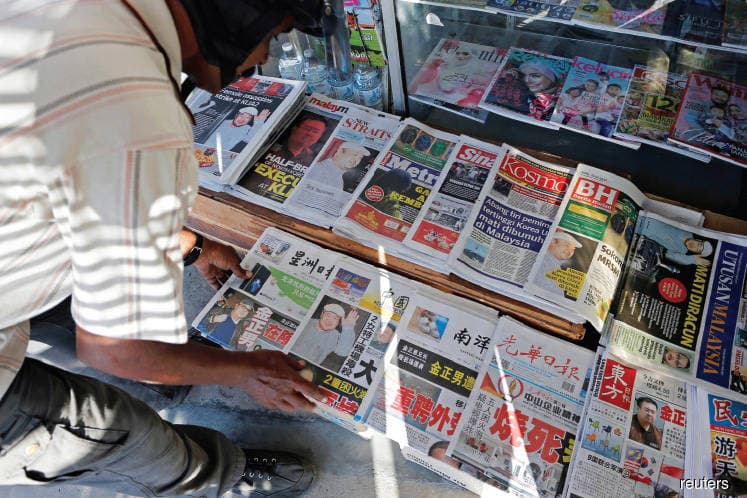
This article first appeared in The Edge Malaysia Weekly on June 4, 2018 - June 10, 2018
THE change of government following the May 9 general election has cast the spotlight on so-called politically linked media groups. Some believe the government of the day would invariably seek some control over the mainstream media. This raises the question of whether this will lead to a change of ownership in companies such as Media Prima Bhd, Utusan Melayu (M) Bhd and Star Media Group Bhd.
The share prices of politically-linked media companies are currently trading at multi-year lows.
Year to date, the shares of Media Prima have declined 45%, to close at 41.5 sen last Friday. The counter was trading at 38 sen on March 30, its lowest level since 2003.
Shares of Utusan Melayu have dropped 36%, to close at its all-time low of 24 sen last Friday.
Meanwhile, shares of Star Media also declined 31% to close at RM1.13 last Friday, its lowest level since 2007.
Media Prima, which has the most newspaper titles in the country, would probably draw the most speculation.
Umno currently holds a 19.05% stake — via Gabungan Kesturi Sdn Bhd and Altima Inc — in Media Prima, which operates four free-to-air television networks and six print publications as well as a number of radio stations. Under the former government, Media Prima was ultimately controlled by BN. In fact, group managing director Datuk Kamal Khalid even ran the communications unit in the Prime Minister’s Office.
But a look at Media Prima’s shareholding structure indicates that Umno could be challenged by other substantial shareholders, such as the Employees Provident Fund (EPF) or Permodalan Nasional Bhd (PNB) if there should be any plans to replace the board.
The media group’s latest annual report shows that the EPF is the second largest shareholder with a 13.25% stake, while PNB, AmanahRaya Bhd and AmanahRaya Trustees Bhd collectively hold 20.65% equity interest. Kumpulan Wang Persaraan (Diperbadankan) or KWAP has 2.07%.
State-owned investment funds thus collectively control a 35.97% stake in Media Prima. That would put Umno, which has less than 20% shareholding, in a vulnerable position.
At Media Prima Television Networks, Datuk Seri Ashraf Abdullah has already stepped down as group managing editor for news and current affairs. His deputy Datuk Manja Ismail has taken over his duties.
Utusan Melayu (M) Bhd is another media group controlled by Umno, which holds a 49.77% stake. The print media group publishes Utusan Malaysia, Mingguan Malaysia and Kosmo!.
The second largest shareholder with a 14.76% stake is Nilam Setar (M) Sdn Bhd, the investment vehicle of tycoon Tan Sri Syed Mokhtar Albukhary. Syed Mokhtar is perceived to have a close relationship with Prime Minister Tun Dr Mahathir Mohamad. This has prompted some to ask if he will become a white knight to revive the group, which is not faring well financially.
Will Umno inject fresh capital to sustain the group? According to news reports, Utusan Melayu’s top brass had told employees at a town hall meeting after the 14th general election that it was facing severe financial conditions and might only be able to continue until the year-end.
Utusan Melayu has been loss-making for six consecutive years, with accumulated losses amounting to RM71.4 million as at March 31.
Notably, four independent, non-executive directors resigned after GE14 as “part of the overall restructuring plan”, according to the media group. The four were company chairman Tan Sri Mohamad Fatmi Che Salleh, Datuk Seri Tengku Sariffuddin Tengku Ahmad (press secretary to former prime minister Datuk Seri Najib Razak), Jamalul Kiram Mohd Zakaria and Mohd Yusof Abu Othman.
Star Media Group Bhd, meanwhile, is 43.03% owned by the Malaysian Chinese Association (MCA). Interestingly, PNB, AmanahRaya Bhd and AmanahRaya Trustees Bhd have a collective stake of 18.06% in the group while the EPF has a 8.38% stake, Lembaga Tabung Haji has 5.39% and KWAP, 0.74%. The media group publishes The Star — the largest circulated English daily. It also operates Chinese-language radio station 988 as well as dimsum.my, a homegrown all-Asian video-on-demand service.
In a nutshell, state-owned investment funds collectively own a 32.57% stake in Star Media. That makes it uncomfortable for MCA if they should disagree with future plans for the media group and decide to act in concert.
Star Media is seen as a major source of income, in the form of dividends, for MCA.
Press freedom is among the key thrusts of the Pakatan Harapan manifesto. Communications and Multimedia Minister Gobind Singh Deo is expected to table a proposal to abolish the Anti-Fake News Act 2018 at the Dewan Rakyat sitting in June.
Against this backdrop, any move by the new government to tighten its grip on the mainstream media is likely to draw flak.
Only time will tell if the new political scene will lead to changes in these media groups.
Save by subscribing to us for your print and/or digital copy.
P/S: The Edge is also available on Apple's AppStore and Androids' Google Play.